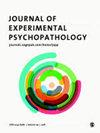Investigation of early night sleep effects on subsequent fear extinction learning and recall
IF 1.9
4区 医学
Q4 PSYCHIATRY
引用次数: 0
Abstract
Extinction learning is considered an important underlying process of successful treatment of posttraumatic stress disorder (PTSD). However, sleep disturbances may impede this learning process: Current accounts postulate that sleep facilitates encoding by promoting neural plasticity during slow wave sleep (SWS). Based on this hypothesis, we tested whether early night sleep, with high amounts of SWS, facilitates subsequent extinction learning and recall. Sixty-three participants took part in a trauma-adapted fear conditioning experiment. One group received a three-hour sleep opportunity in the early night half, whereas the other group stayed awake. Thereafter, both groups underwent extinction training and a return-of-fear test. Retention was assessed after another sleep opportunity in both groups. Linear mixed-effects models and Bayesian inference did not support the hypothesis of strengthened fear extinction by prior early night sleep. Subsequent exploratory analyses, in contrast, point to a role of rapid eye movement sleep in promoting successful fear extinction learning. Further confirmatory research should re-investigate these effects and their implications for the treatment of PTSD.早睡对随后恐惧消退学习和回忆影响的研究
灭绝学习被认为是成功治疗创伤后应激障碍(PTSD)的重要基础过程。然而,睡眠障碍可能会阻碍这一学习过程:目前的研究假设,睡眠通过促进慢波睡眠(SWS)期间的神经可塑性来促进编码。基于这一假设,我们测试了具有大量SWS的早睡是否有助于随后的灭绝学习和回忆。63名参与者参加了一项适应创伤的恐惧条件实验。其中一组人在半夜有三个小时的睡眠机会,而另一组人则保持清醒。此后,两组都接受了灭绝训练和恐惧回归测试。两组患者在再次获得睡眠机会后对记忆力进行评估。线性混合效应模型和贝叶斯推断不支持先前早睡增强恐惧消退的假设。相反,随后的探索性分析指出,快速眼动睡眠在促进成功消除恐惧学习中的作用。进一步的验证性研究应该重新调查这些影响及其对创伤后应激障碍治疗的影响。
本文章由计算机程序翻译,如有差异,请以英文原文为准。
求助全文
约1分钟内获得全文
求助全文
来源期刊

Journal of Experimental Psychopathology
Medicine-Psychiatry and Mental Health
CiteScore
2.00
自引率
0.00%
发文量
19
审稿时长
11 weeks
期刊介绍:
The Journal of Experimental Psychopathology (EPP) is an open access, peer reviewed, journal focused on publishing cutting-edge original contributions to scientific knowledge in the general area of psychopathology. Although there will be an emphasis on publishing research which has adopted an experimental approach to describing and understanding psychopathology, the journal will also welcome submissions that make significant contributions to knowledge using other empirical methods such as correlational designs, meta-analyses, epidemiological and prospective approaches, and single-case experiments.
 求助内容:
求助内容: 应助结果提醒方式:
应助结果提醒方式:


